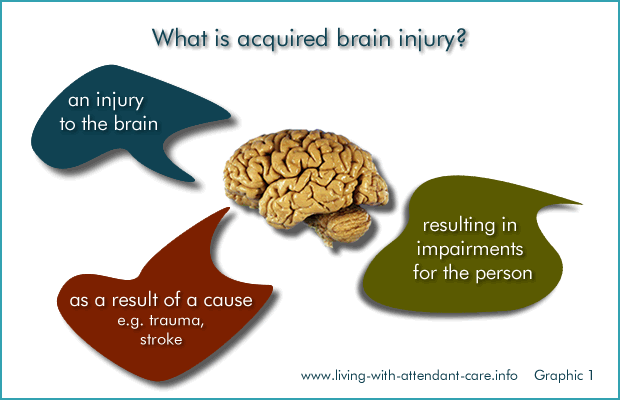- Acquired Brain Injury An introduction for people new to brain injury
- What is acquired brain injury? Understanding the essence of acquired brain injury
- Causes of acquired brain injury The many possible causes of brain injury
- Injury, effects and impacts Injuries to the brain have effects in the brain that lead to impacts in people's lives
- Rehabilitation The rehabilitation process from injury to living in the community
- People with ABI People's experiences of having acquired brain injury
- Attendant care challenges Challenges for people with brain injury getting attendant care
What is acquired brain injury?

A definition of Acquired Brain Injury (ABI)
The Australian National Policy on Services for People with Acquired Brain Injury defines ABI as:
"An injury to the brain which results in deterioration in
- cognitive,
- physical,
- emotional or
- independent functioning.
- trauma,
- hypoxia,
- infection,
- tumour,
- substance abuse,
- degenerative neurological diseases
- or stroke.
- temporary or
- permanent
- partial or total disability or
- psychosocial maladjustment."
ABI is different from . . .
ABI can be a hidden disability
Acquired brain injury (ABI) is often called a hidden disability because its effects are often not easy to see and recognise, for example effects in areas of thinking and behaviour.
Physical issues can be quite obvious yet it is often the "unseen" changes to the way a person thinks that can pose the greatest difficulties for people with ABI.
People with ABI may be misunderstood and ignored by others as a consequence of the invisibility of their disability. How they act and respond to others can be misinterpreted and not linked to their ABI.
ABI is different from ageing
The process of ageing is not an ABI.
ABI is different from disease
Disease has a known progression. ABI does not (unless it is an ABI caused by a degenerative disease - see Causes of ABI).
ABI is different from intellectual disability (ID)
Intellectual disability is present from birth, ABI is not.
People with ABI and ID can present with similar symptoms and impairment, such as cognitive and sensory difficulties. However, an acquired brain injury can occur at any age after birth, in contrast to an Intellectual Disability, which most commonly exists from birth.
What most distinguishes ABI from ID is that most people with an ABI retain their pre-injury intellectual abilities, the injury having merely impaired the expression of these abilities.
With treatment and support, most people with an ABI can expect their symptoms to improve and to recover some of their former capabilities through rehabilitation. By contrast, people with an ID are more likely to be involved in habilitation programs (being able to make the most of their current capabilities).
ABI is different from mental illness
Mental illnesses are diagnosed illnesses usually with known treatments. ABI is not. ABI is sometimes mistaken for a mental illness.
A person is said to have a mental illness if an appropriately qualified professional can elicit the necessary symptoms to meet pre-set criteria that diagnose certain conditions (somewhat like using a recipe book). The diagnosis of mental illness is not always a reliable and consistent process, particularly for complicated cases such as patients who have a co-existing intellectual disability, a drug and alcohol problem, or an acquired brain injury.
The key point of difference is that the symptoms of mental illness are usually treatable with drugs, whereas ABI is not.
ABI is often mistaken for mental illness and people may be treated with drugs that don't help recovery. Depression, for example, may be a normal psychological response in people who experience an acquired brain injury, but may also result from the injury itself.
ABI is however distinct from mental illnesses, such as schizophrenia, bipolar disorder, depression or obsessive compulsive disorder. Treatments for these mental illnesses (most commonly medication and psychological therapy) are very different to the support required by people with ABI. Different health services are involved in managing and treating people with mental illness and severe ABI.
It should be noted however that mental illness, like ABI, can affect a person's cognitive processes. Also, mental health problems such as depression can be significant issues for people with ABI.


